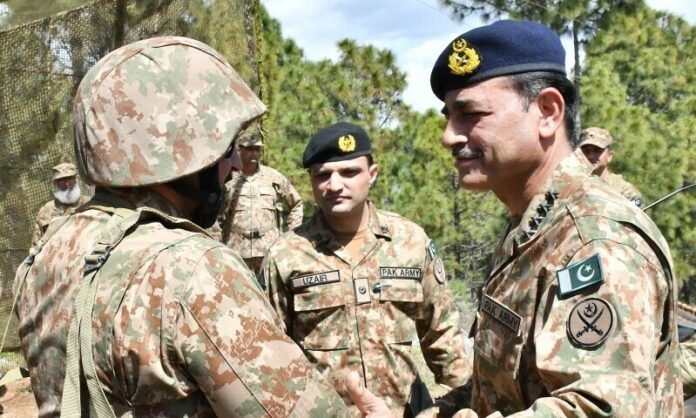In any working democracy, theocratic or secular, civilian control of the military is a non-negotiable principle. It ensures that national policy is determined by elected politicians, who are accountable to the people, rather than by unelected and potentially reckless military leaders. South Asia presents two radically different examples of how this dynamic works out. While India, a secular state, has adhered to civilian supremacy since independence, Pakistan’s political landscape has been repeatedly overshadowed by military dominance. The contrast between these two neighbouring nations highlights why keeping the military out of politics is not only important but essential for democratic stability and national development. The concentration of political and military powers in the same hands — or the politicisation of the military for personal gain by politicians — not only undermines the sanctity of both the military and politics, but also threatens the identity of the state itself. The separation of politics and military covers multiple aspects i.e. non-interference, functional specialisation and division of institutions.
Case of Pakistan
Pakistan has experienced three major military coups — in 1958, 1977, and 1999 — and spent nearly 33 of its 77 years under direct military rule. Even out of power, the armed forces have maintained considerable influence over crucial domains, including foreign policy, domestic security, and national budgetary allocations. The military also has a vast economic empire through organisations such as the Fauji Foundation and Army Welfare Trust, with assets worth more than $26 billion, defence analyst Ayesha Siddiqa estimates. In 2021, Pakistan’s military expenditure was $11.3 billion, roughly 3.8% of its GDP — an exorbitantly high amount considering its economic woes. Politicians like Benazir Bhutto and Nawaz Sharif were removed from power following confrontations with the military, further demonstrating how vulnerable political rule is in Pakistan.
The military’s dominance had long-term implications in Pakistan. It resulted in political instability, a weaker government, human rights abuses, media repression, and a climate of impunity, and institution-building was hindered. The military control over foreign policy, particularly on issues concerning India and Afghanistan, resulted in the diplomatic isolation of Pakistan
This dominance has had long-term implications. Political instability has become the norm, the government is weak, and institution-building is hindered. In addition, the military stranglehold over foreign policy — particularly on issues concerning India and Afghanistan — has resulted in extended diplomatic isolation. Military-backed governments have also nurtured human rights abuses, media repression, and a climate of impunity. The civilian governments that have come and gone, which have usually been crippled or controlled by the military, have rendered economic and social planning on a sustained basis virtually impossible.
Case of India
India is a considerably different scenario. Since acquiring political independence in 1947, it has always maintained the doctrine of political control over the military. Notwithstanding several wars, internal rebellions, and border conflicts, India has never had a military coup. Its military is deeply professional, serving under the Ministry of Defence and guided by a chain of command headed by elected leaders. India’s defence budget was $81.4 billion in 2024, the fourth largest globally, but it represented only 1.9% of GDP — a proportion that indicates a more equitable policy towards national priorities.
The separation of political and military powers has enabled India to concentrate on economic growth, technological development, and democratic consolidation. With a history of peaceful transfers of power and continuous elections every five years, Indian institutions have become stronger over time, with few exceptions. The military has remained majorly depoliticised and professionally independent, enjoying both popular respect and the trust of the international community. Separation has also contributed to India having a stable and multi-dimensional foreign policy, presenting its national interest of emerging global power beyond security goals.
Implications
The wider implications of military intervention in Pakistan’s politics are well recorded. It resulted in the erosion of political institutions, diminished accountability, constrained civil liberties, and economic instability. All these have contributed to a system of governance that focused on short-term rule at the expense of long-term growth and development in the country. India’s case, on the other hand, shows the advantages of institutional autonomy, non-interference, and a well-defined division of functions.
The lesson is obvious: an apolitical, professional army is crucial for a modern state to succeed. Pakistan will need to make certain fundamental reforms, such as shrinking the military’s political and economic role, openness in defence affairs, and strengthening civilian institutions. For nations on a divided road, India’s path of democratic rule holds a way forward — where the military protects the state, rather than controls or manipulates it.
In a world where international stability is increasingly fragile, the division between politics and the military is not merely an internal issue; it is a matter of global security and democratic integrity. South Asia, with its complex history and nuclear arsenals, cannot afford the consequences of ambiguous borders. The risks are simply too high, as demonstrated by the heightened tensions between India and Pakistan following the Pahalgam attack. Both countries stood on the brink of full-fledged war, driven in part by the politicisation of military power.
Since its Independence in 1947, India has always maintained the doctrine of political control over the military. Notwithstanding several wars, internal rebellions, and border conflicts, India has never had a military coup. Its military is deeply professional, serving under the Ministry of Defence and guided by a chain of command headed by elected leaders
The continuous involvement of the military in Pakistan’s politics has severely eroded the process of democratisation, peaceful resolution of the conflict, progress, compromised civilian institutions, and lent itself towards chronic instability across the Indo-Pakistan border, while India’s commitment to political dominance has facilitated deep governance and resilience in institutions. The difference highlights that democracy cannot thrive where unelected actors hold uncontrolled sway. For Pakistan to attain sustainable advancement, it has to begin with structural change that contains as far as possible the role of the military to defence only, increase transparency in civil-military relations, and strengthen democratic institutions via constitutional guarantees and civilian oversight. Only by such a rebalancing can the nation end the cycle of political weakness and transition towards authentic democratic consolidation.
The political-military imbalance has major implications for India-Pakistan relations. In Pakistan, the overweening influence of the military in foreign policy, especially towards India, has tended to make strategic confrontation take precedence over diplomatic encounter. This has led to a security-driven foreign policy, characterised by hard borders, continuous cross-border infiltrations, distrust, proxy wars, and spasmodic flashpoints, like the Kargil War in 1999, that were planned out of the reach and without the knowledge of Pakistan’s political masters. In contrast, India’s foreign policy choices are primarily guided by elected governments with more general strategic and economic concerns. This imbalance hinders continuous dialogue and makes peace efforts risky, as Pakistan’s civilian governments cannot regularly sign or enforce lasting terms. A more equitable political-military balance in Pakistan can make way for more stable and significant diplomatic interaction with India, leading to enduring peace and regional cooperation.
The divergent paths of India and Pakistan in grappling with political-military relations point to an essential truth: a modern state is where the military is under the control of civilian government, and is undermined where it intrudes into governance. Pakistan’s military coup history, institutional encroachment, and dominance of foreign and security policy have not only diminished its democratic potential but also destabilised internal governance and strained regional ties, especially with India. Conversely, India’s firm dedication to political/civilian control has allowed for uniform democratic evolution, economic growth, and an improved foreign policy. This divergence has also impeded the potential for continuous India-Pakistan dialogue, as Pakistani civilian leaders tend not to have the freedom to engage in long-term diplomatic endeavours.
South Asia, with its complex history and nuclear arsenals, cannot afford the consequences of ambiguous borders. The risks are simply too high, as demonstrated by the heightened tensions between India and Pakistan following the Pahalgam attack. Both countries stood on the brink of full-fledged war, driven in part by the politicisation of military power
Way Forward
To get back on track, Pakistan needs political liberation to unambiguously define the role of the military – confining it to national defence – while consolidating democratic institutions through constitutional guarantees, judicial autonomy, open government, and strong parliamentary control. In addition, both nations need to invest in confidence-building measures, institutionalised talks, and demilitarised diplomacy to deflect hostility and tap the potential for peaceful existence. A depoliticised Pakistani military is not only a national necessity but also a regional imperative, as its current role hinders the positive reshaping of South Asia’s future. In this project, India can provide constructive guidance by upholding the sanctity of its institutions, which sometimes also face challenges and risk being derailed by various factors.
The writer teaches Political Science at Lovely Professional University, India. His academic interests include Political Thought, Public Policy, and Public Administration, with a specific focus on the implementation of various governmental Acts, Programmes, and Schemes. The views expressed are personal and do not necessarily carry the views of Raksha Anirveda






